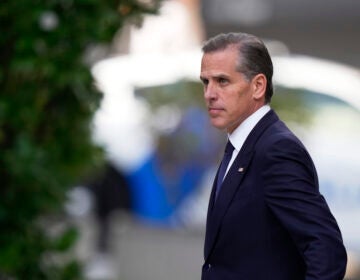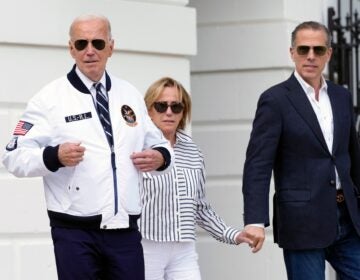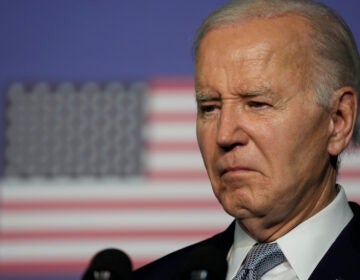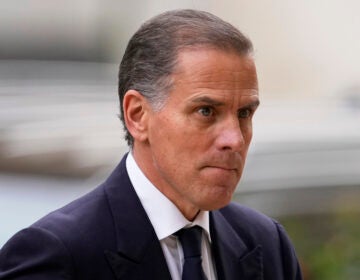Lawyers spar in Wilmington court over whether Hunter Biden ‘knowingly’ lied on federal gun purchase form about drug use
The trial will feature testimony from three of Biden’s exes — Zoe Keston, ex-wife Kathleen Buhle and Hallie Biden, the widow of Hunter’s brother.
Listen 1:22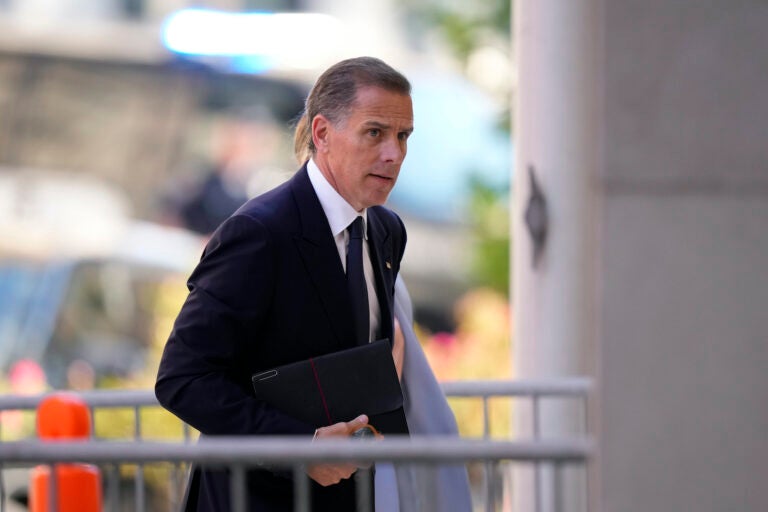
Hunter Biden arrives at federal court, Tuesday, June 4, 2024, in Wilmington, Del. (AP Photo/Matt Slocum)
The one matter that both sides agreed on during opening arguments Tuesday in Hunter Biden’s federal trial was that the president’s son was a longtime user of crack cocaine when he bought a handgun in Delaware.
The major disagreement is over whether the younger Biden lied on October 12, 2018, when he filled out a federal firearm purchase form that asks buyers if they are an unlawful user of drugs or an addict.
Assistant U.S. Attorney Derek Hines told jurors it’s crystal clear that Biden provided false statements on Form 4473. Defense attorney Abbe Lowell countered that people struggling with addiction are often in denial, and that prosecutors can’t prove that his client “knowingly’’ lied on the form.
With First Lady Jill Biden sitting in a spectator’s row behind her adopted son, flanked by other family members and friends in a Wilmington courtroom packed with reporters and lawyers, Hines told jurors the evidence is overwhelming that Biden committed federal felonies when he bought a .38 special handgun, 25 “hollow point” bullets, and a speed loader at StarQuest Shooters & Survival Supply gun shop on U.S. 202, north of Wilmington.
At the courthouse just a few miles from President Biden’s home in Greenville and where Hunter grew up, Hines also emphasized that Hunter Biden’s status as a member of a politically elite family should not protect him from prosecution for crimes.
“We’re here because of the defendant’s lies and choices,” Hines said. “No one is above the law. It doesn’t matter who you are or what your name is.”
The key fact, Hines said, is that Hunter Biden, who had left rehab in California a month before coming to Delaware and walking into the StarQuest store, “chose to illegally own a firearm” and that the law governing purchases “makes no distinction between Hunter Biden and anybody else.”
And the bottom line, the prosecutor told jurors, is that “because he lied, Mr. Biden was allowed to walk out of that store” with a lethal weapon and ammunition and drive off in his father’s black Cadillac, which he was driving that day.
Hines told jurors they will hear excerpts from Biden’s autobiography, in which he repeatedly admitted to rampant crack cocaine use.
Hines said the government’s witnesses will include gun shop employees, law enforcement officers and three of Biden’s former lovers — Zoe Keston, ex-wife Kathleen Buhle, and his late brother Beau’s widow, Hallie Biden.
Hallie Biden discovered the gun outside her home in Greenville on Oct. 23, when she looked in his Ford F-150 Raptor truck.
Worried about possible danger from Hunter having a weapon, she threw the gun, bullets, and speed loader in the trash at the nearby Janssen’s grocery store, said Hines, telling jurors a story that has been the subject of press coverage for several years. It was later found by a man who routinely combed through trash looking for recyclables, and that man will also testify, Hines said.
Hallie Biden will also testify about messages she received from Hunter Biden during the 11 days he had the gun that indicated he was using drugs, Hines said.
Biden spoke in one about waiting for a dealer to deliver him drugs outside Frawley Stadium, where the Wilmington Blue Rocks minor league baseball team plays its home games, Hines said.
In another, Hunter said he was in a car smoking crack at Fourth and Rodney streets in a high-crime section of Wilmington.
Hines also stressed that to convict Biden of two counts of providing false statements and possession of a firearm by a drug user, they need not determine that he was using cocaine the day of the purchase.
“We will show you overwhelming evidence’’ to prove Biden broke the law designed to keep firearms out of the hands of drug addicts, Hines said.
Hunter Biden, a Yale-educated lawyer and businessman who has said he has been clean since 2019, sat quietly next to Lowell while Hines detailed his alleged crimes.
Defense says key issue is ‘what Hunter thought at the time’
The trial now underway is the first of two that Hunter Biden faces in the wake of last year’s dramatic collapse of a plea deal on both the gun charges related to his drug use and misdemeanor crimes for failing to pay more than $1 million in federal income taxes.
After U.S. District Judge Maryellen Noreika would not accept the plea during a contentious hearing last July in the same Wilmington courthouse, prosecutors led by U.S. Attorney David Weiss of Delaware went back to the drawing board.
Weiss, who was named a special prosecutor by U.S. Attorney Merrick Garland, later filed the three felony gun charges at issue in the current case. Biden also faces a September federal trial on felony tax evasion and other tax-related charges in Los Angeles, where he lived from 2016 through 2019.
While Joe Biden was not president during the period of the alleged crimes, having been elected in 2020, Hunter is the first child of a sitting president to stand trial in U.S. history.
Lowell, a prominent Washington, D.C., attorney who followed Hines to the podium Tuesday, told jurors the government could not meet its burden to prove him guilty beyond a reasonable doubt.
Lowell urged the 12 members to keep an open mind about how Hunter Biden viewed his condition and his addiction when he bought the Colt Cobra revolver as well as a BB gun while waiting for his new cell phone to get processed at an AT&T store across the highway known as Concord Pike.
Lowell stressed that the federal form asks a prospective firearms buyer whether he or she “is a user, is an addict” as opposed to “have you ever” been one.
Lowell conceded “there is no disagreement” that his client has suffered from addiction and alcoholism, asserting that it stems in part from traumas such as his brother Beau’s death from brain cancer in 2015 and his mother and sister’s death in a 1972 car accident when he was a young child. Hunter and Beau survived that crash in the Hockessin area of northern Delaware.
The key issue, though, said Lowell, is “what Hunter thought at the time” he bought the handgun.
Lowell told jurors that people who suffer from addiction are often “in a deep state of denial” and that by checking “no” on the form, he didn’t intend to deceive the gun store or federal authorities.
The attorney stressed that while Form 4473 has definitions about terms such as fugitive, it included no definitions for “addicted to” or “unlawful user” of drugs – the two critical terms in question for the trial.
Lowell also noted that it was Hallie Biden who “freaked out” and “created a firestorm’’ that ultimately led to a police investigation and the current charges “by throwing out the gun.”
The defense lawyer suggested that Hunter wasn’t admitting drug use when he sent the message about smoking crack in a car in Wilmington not long after the purchase, but rather said so because “ he did not want to see Hallie,’’ who also had been a user of crack cocaine.
And while Hines had said that the pouch Hallie put the gun in had a white powder that a prosecution witness will testify was cocaine, Lowell said the pouch belonged to Hallie — not Hunter.
Lowell also scoffed at the idea that Hunter Biden, who had written about having guns pointed at him during drug deals, had ever put anybody in danger.
For the entire 11-day period that Hunter had the handgun, Lowell said, it was never loaded and always was kept in a blue lock box in his truck.
“The gun,” Lowell said, “never came out of the lockbox.”

Get daily updates from WHYY News!
WHYY is your source for fact-based, in-depth journalism and information. As a nonprofit organization, we rely on financial support from readers like you. Please give today.



